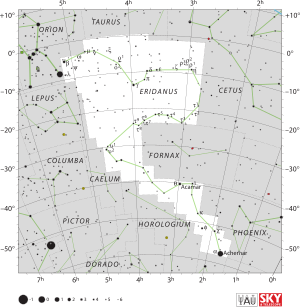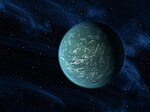HD 30856
| Observation data Epoch J2000.0[1] Equinox J2000.0[1] | |
|---|---|
| Constellation | Eridanus[2] |
| Right ascension | 04h 50m 17.8614408264s[1] |
| Declination | −24° 22′ 07.833769068″[1] |
| Apparent magnitude (V) | 7.911[1][3] |
| Characteristics | |
| Evolutionary stage | Red-giant branch star[1] |
| Spectral type | K0III[1][3] |
| B−V color index | 0.961[1][3] |
| Astrometry | |
| Radial velocity (Rv) | 35.71[1] km/s |
| Proper motion (μ) | RA: 18.469[1] mas/yr Dec.: −19.837[1] mas/yr |
| Parallax (π) | 7.5965 ± 0.0179 mas[1] |
| Distance | 429 ± 1 ly (131.6 ± 0.3 pc) |
| Orbit[4] | |
| Primary | HD 30856 A |
| Companion | HD 30856 B |
| Semi-major axis (a) | 0.786″ |
| Details | |
| HD 30856 A | |
| Mass | 1.17[5] / 1.35[4] M☉ |
| Radius | 4.40[5] R☉ |
| Luminosity | 9.9±0.5[6] L☉ |
| Surface gravity (log g) | 3.20[5] cgs |
| Temperature | 4895[5] / 4982 ± 44[4] K |
| Metallicity [Fe/H] | −0.06±0.03[6] dex |
| Rotational velocity (v sin i) | 2.85[6] km/s |
| HD 30856 B | |
| Mass | 0.54±0.01[4] M☉ |
| Surface gravity (log g) | 4.7[4] cgs |
| Temperature | 3700–4150[4] K |
| Other designations | |
| Database references | |
| SIMBAD | data |
HD 30856 (proper name Mouhoun) is a binary system between HD 30856 A (often simply HD 30856[6][7]), a K-type giant star, and HD 30856 B, a red dwarf companion, located in the constellation of Eridanus about 430 light-years distant.[2][1] A super-Jupiter exoplanet, HD 30856 b (proper name Nakanbé), is known to orbit the primary star.[6]
Stellar characteristics
[edit]HD 30856 A is an evolved star in the red-giant branch, with a spectral type of K0 III, a radius of 4.4 R☉, and a mass of 1.17 M☉. The surface temperature of HD 30856 is estimated to be about 4,895 K, which gives it an orange color. The star is roughly 10 times as bright as the Sun, which, combined with a distance of 429 light-years, places its apparent magnitude at 7.91,[3][5][6] too dim to be visible from Earth by the naked eye.[8] The star is aged approximately 3.8 billion years,[6] making it younger than the Sun (4.6 billion years old[9]).
Companion star
[edit]Through the use of adaptive optics, observations at the Keck II telescope in Hawaii revealed the existence of another star, designated HD 30856 B, about 0.8 arcseconds east-southeast of HD 30856.[4] HD 30856 B has a mass of 0.54 M☉ and a temperature of 3700–4150 K,[4][a] typical for an M0V–M1V red dwarf.[10][11][12][b]
Since the star shares a very similar proper motion with HD 30856 A, the two stars are believed to be in a binary system. HD 30856 B revolves around the primary star (A) in a wide orbit, with a semi-major axis of 93 ± 8 AU.[4]
Nomenclature
[edit]In 2019, the People's Republic of Burkina Faso was assigned to giving the HD 30856 A system a proper name as part of the IAU100 NameExoWorlds Project,[2] planned to celebrate the hundredth anniversary of the International Astronomical Union (IAU), which grants the right to name an exoplanetary system to every state and territory in the world. Names were submitted and selected within Burkina Faso, which were then presented to the IAU to be officially recognized.[13] On 17 December 2019, the IAU announced that HD 30856 A and its planet, b, were named Mouhoun and Nakanbé, respectively.[7]
Mouhoun is named after the Black Volta (locally called Mouhoun), Burkina Faso's largest river that serves a crucial societal role in the western part of the country. Nakanbé is the native name for the White Volta, the second largest river in the nation with its source located in the Sahel region.[7]
Planetary system
[edit]In 2011, radial-velocity observations made at the W. M. Keck Observatory revealed the existence of one exoplanet around HD 30856 A.[6] The planet, HD 30856 Ab, is thought to be a gas giant at least 1.5 times the mass of Jupiter, which orbits its host star at a distance of 1.85 AU once every 847 days (2.32 years).[5] Its orbit is nearly circular (i.e., with a low eccentricity),[5] similar to planets in the Solar System.[14]
| Companion (in order from star) |
Mass | Semimajor axis (AU) |
Orbital period (days) |
Eccentricity | Inclination | Radius |
|---|---|---|---|---|---|---|
| HD 30856 Ab (Nakanbé) | >1.547 MJ | 1.85 | 847.468 ± 19.811 | 0.061 ± 0.058 | — | 1.228 RJ |
References
[edit]- ^ a b c d e f g h i j k l m "HD 30856". SIMBAD. Centre de données astronomiques de Strasbourg. Retrieved 2024-07-30.
- ^ a b c "List of stars and planets". Name ExoWorlds. IAU. Retrieved 2019-09-15.
- ^ a b c d ESA (1997), The HIPPARCOS and TYCHO catalogues. Astrometric and photometric star catalogues derived from the ESA HIPPARCOS Space Astrometry Mission, ESA SP Series, vol. 1200, Noordwijk, Netherlands: ESA Publications Division, Bibcode:1997ESASP1200.....E, ISBN 9290923997
- ^ a b c d e f g h i Ngo, Henry; Knutson, Heather A.; Bryan, Marta L.; Blunt, Sarah; Nielsen, Eric L.; Batygin, Konstantin; Bowler, Brendan P.; Crepp, Justin R.; Hinkley, Sasha; Howard, Andrew W.; Mawet, Dimitri (2017-06-01). "No Difference in Orbital Parameters of RV-detected Giant Planets between 0.1 and 5 au in Single versus Multi-stellar Systems". The Astronomical Journal. 153 (6): 242. arXiv:1704.02326. doi:10.3847/1538-3881/aa6cac. ISSN 0004-6256.
- ^ a b c d e f g h Luhn, Jacob K.; Bastien, Fabienne A.; Wright, Jason T.; Johnson, John A.; Howard, Andrew W.; Isaacson, Howard (2019-04-01). "Retired A Stars and Their Companions. VIII. 15 New Planetary Signals around Subgiants and Transit Parameters for California Planet Search Planets with Subgiant Hosts". The Astronomical Journal. 157 (4): 149. arXiv:1811.03043. doi:10.3847/1538-3881/aaf5d0. ISSN 0004-6256.
- ^ a b c d e f g h Johnson, John Asher; Clanton, Christian; Howard, Andrew W.; Bowler, Brendan P.; Henry, Gregory W.; Marcy, Geoffrey W.; Crepp, Justin R.; Endl, Michael; Cochran, William D.; MacQueen, Phillip J.; Wright, Jason T.; Isaacson, Howard (2011-12-01). "RETIRED A STARS AND THEIR COMPANIONS. VII. 18 NEW JOVIAN PLANETS". The Astrophysical Journal Supplement Series. 197 (2): 26. arXiv:1108.4205. doi:10.1088/0067-0049/197/2/26. ISSN 0067-0049.
- ^ a b c "Approved names" (PDF). NameExoWorlds. IAU. p. 4. Retrieved 2024-07-30.
- ^ John E. Bortle (February 2001). "The Bortle Dark-Sky Scale". Sky & Telescope. Archived from the original on 2009-03-23. Retrieved 2009-11-18.
- ^ Connelly, J. N.; Bizzarro, M.; Krot, A. N.; Nordlund, Å.; Wielandt, D.; Ivanova, M. A. (2 November 2012). "The Absolute Chronology and Thermal Processing of Solids in the Solar Protoplanetary Disk". Science. 338 (6107): 651–655. Bibcode:2012Sci...338..651C. doi:10.1126/science.1226919. PMID 23118187. S2CID 21965292.(registration required)
- ^ Pecaut, Mark J.; Mamajek, Eric E. (1 September 2013). "Intrinsic Colors, Temperatures, and Bolometric Corrections of Pre-main-sequence Stars". The Astrophysical Journal Supplement Series. 208 (1): 9. arXiv:1307.2657. Bibcode:2013ApJS..208....9P. doi:10.1088/0067-0049/208/1/9. ISSN 0067-0049. S2CID 119308564.
- ^ Mamajek, Eric (2 March 2021). "A Modern Mean Dwarf Stellar Color and Effective Temperature Sequence". University of Rochester, Department of Physics and Astronomy. Retrieved 5 July 2021.
- ^ Cifuentes, C.; Caballero, J.A.; Cortés-Contreras, M.; Montes, D.; Abellán, F.J.; Dorda, R.; Holgado, G. (2020). "CARMENES input catalogue of M dwarfs. V. Luminosities, colours, and spectral energy distributions". Astronomy and Astrophysics. 642 (October 2020): 32. arXiv:2007.15077. Bibcode:2020A&A...642A.115C. doi:10.1051/0004-6361/202038295.
- ^ "Methodology". Name ExoWorlds. IAU. Retrieved 2019-09-15.
- ^ Limbach, MA; Turner, EL (2015). "Exoplanet orbital eccentricity: multiplicity relation and the Solar System". Proc Natl Acad Sci U S A. 112 (1): 20–4. arXiv:1404.2552. Bibcode:2015PNAS..112...20L. doi:10.1073/pnas.1406545111. PMC 4291657. PMID 25512527.
Footnotes
[edit]See also
[edit]- List of proper names of stars
- List of proper names of exoplanets
- List of stars in Eridanus
- List of exoplanets discovered in 2011
External links
[edit]- Jean Schneider. "Planet HD 30856 b". The Extrasolar Planet Encyclopaedia. Retrieved 2024-07-30.
- "HD 30856 Overview". NASA Exoplanet Archive. Retrieved 2024-07-30.
- HD 30856 on WikiSky: DSS2, SDSS, GALEX, IRAS, Hydrogen α, X-Ray, Astrophoto, Sky Map, Articles and images
- "Burkina Faso | IAU100 Name ExoWorlds". IAU. Retrieved 2024-07-30.




